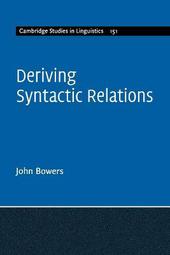
|
Deriving Syntactic Relations
Paperback / softback
Main Details
| Title |
Deriving Syntactic Relations
|
| Authors and Contributors |
By (author) John Bowers
|
| Series | Cambridge Studies in Linguistics |
|---|
| Physical Properties |
| Format:Paperback / softback | | Pages:306 | | Dimensions(mm): Height 230,Width 150 |
|
| Category/Genre | linguistics
Grammar and syntax |
|---|
| ISBN/Barcode |
9781107480650
|
| Classifications | Dewey:415 |
|---|
| Audience | | Professional & Vocational | |
|---|
|
Publishing Details |
| Publisher |
Cambridge University Press
|
| Imprint |
Cambridge University Press
|
| Publication Date |
24 September 2020 |
| Publication Country |
United Kingdom
|
Description
A pioneering new approach to a long-debated topic at the heart of syntax: what are the primitive concepts and operations of syntax? This book argues, appealing in part to the logic of Chomsky's Minimalist Program, that the primitive operations of syntax form relations between words rather than combining words to form constituents. Just three basic relations, definable in terms of inherent selection properties of words, are required in natural language syntax: projection, argument selection, and modification. In the radically simplified account of generative grammar Bowers proposes there are just two interface levels, which interact with our conceptual and sensory systems, and a lexicon from which an infinite number of sentences can be constructed. The theory also provides a natural interpretation of phase theory, enabling a better formulation of many island constraints, as well as providing the basis for a unified approach to ellipsis phenomena.
Author Biography
John Bowers is Professor in the Department of Linguistics at Cornell University, New York. He has published two books, the most recent of which is Arguments as Relations (2010), published in the Linguistic Inquiry Monograph Series. He has also published numerous journal articles and book chapters focusing primarily on the areas of predication, transitivity, argument structure, and control.
Reviews'This book challenges assumptions that have gone unquestioned for too long, while hewing to the core principles of the Minimalist Program. It will be useful and thought-provoking to generative syntacticians of all theoretical persuasions.' Elizabeth Cowper, University of Toronto
|